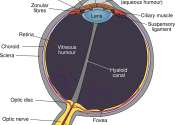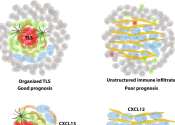Last update:
Oncology & Cancer news
Oncology & Cancer
Improving cancer immunotherapy by prolonging T-cell survival
In the past decade, immunotherapy has emerged as the fourth pillar of cancer treatment, joining surgery, radiotherapy and chemotherapy. It is an approved treatment for 15 cancers, including melanoma and some types of lymphomas ...
11 hours ago
0
43
Oncology & Cancer
Hitchhiking of synthetic antigen stimulates antibody production against cancer cells
Researchers at the Indian Institute of Science (IISc) have designed a synthetic compound (antigen) that can latch on to a protein in blood and hitchhike a ride to the lymph node, where it can boost the production of antibodies ...
16 hours ago
0
14
Researchers find obese people and tall, centrally obese people are more likely to get colorectal cancer
A large international team of medical researchers has found that people with two types of body shape are more likely to develop colorectal cancer than people with other body types. In their study, published in the journal ...

Genetically engineering a treatment for incurable brain tumors
Purdue University researchers are developing and validating a patent-pending treatment for incurable glioblastoma brain tumors. Glioblastomas are almost always lethal with a median survival time of 14 months. Traditional ...
16 hours ago
0
29

Expert reviews the current state of retinoblastoma research
Retinoblastoma is a rare pediatric cancer, with approximately 250–300 new cases per year in the United States and 8,000 worldwide. The cancer grows within the retina, a thin layer of cells at the back of the eye, and is ...
18 hours ago
0
0

Writing to wellness: New therapy helps cancer patients face biggest fears
Imagine your greatest fear. Now, write it down and tell it in first-person, as if it's happening right now. Vividly describe what it looks, sounds, smells, tastes and feels like. Don't hold back.
15 hours ago
0
8

Neighborhood disadvantage tied to shorter breast cancer-specific survival
Neighborhood disadvantage is associated with shorter breast cancer-specific survival, according to a study published online April 18 in JAMA Network Open.
15 hours ago
0
0

Review explores cutaneous manifestations of myelodysplastic syndrome
Cutaneous manifestations of myelodysplastic syndrome (MDS) are described in a perspective piece published in the April issue of Skin Health and Disease.
15 hours ago
0
0

Research team reports on blood-based multi-omics guided detection of a precancerous pancreatic tumor
A new case report published in OMICS: A Journal of Integrative Biology describes how longitudinal multi-omics monitoring (LMOM) helped to detect a precancerous pancreatic tumor and led to a successful surgical intervention.
11 hours ago
0
1

How does aspirin help prevent colorectal cancer development and progression?
Long-term daily use of aspirin can help to prevent the development and progression of colorectal cancer, but the mechanisms involved have been unclear. New research has revealed that aspirin may exert these protective effects ...
Apr 22, 2024
0
2

Researchers develop a new way to safely boost immune cells to fight cancer
Last year alone, more than 600,000 people in the United States died from cancer, according to the American Cancer Society. The relentless pursuit of understanding this complex disease has shaped medical progress in developing ...
Apr 19, 2024
0
113

Using AI to trace the origins of metastatic cancer cells
A large team of cancer researchers affiliated with several institutions in China, working with a pair of colleagues in the U.S., has found that artificial intelligence applications can be used to trace the origins of metastatic ...

Study of cancer-induced liver inflammation finds a promising therapeutic target
Liver inflammation, a common side-effect of cancers elsewhere in the body, has long been associated with worse cancer outcomes and more recently associated with poor response to immunotherapy. Now, a team led by researchers ...
Apr 19, 2024
0
34

Cancer is a disease of aging, but studies of older adults sorely lacking, review suggests
A systemic review of the current body of research shows that investigators have inadequately addressed the intersection of aging, health disparities, and cancer outcomes among older adults. This is the conclusion of a paper ...
Apr 19, 2024
0
19

New insights into the connections between alcohol consumption and aggressive liver cancer
While heavy drinking is a well-established risk factor for liver cancer, the specific mechanisms by which alcohol contributes to A-HCC remain unclear.
Apr 19, 2024
0
0

Tumor deposits in colorectal and gastric cancers
Tumor deposits (TDs), initially recognized in colorectal cancer, have been identified in various other cancer types, including gastric cancer. It is defined as aggregates of tumor cells found in adipose and fibrous tissues ...
Apr 19, 2024
0
0

New urine-based test detects high-grade prostate cancer, helping men avoid unnecessary biopsies
Researchers at the University of Michigan Rogel Cancer Center have developed a new urine-based test that addresses a major problem in prostate cancer: how to separate the slow-growing form of the disease unlikely to cause ...
Apr 18, 2024
0
42

Mutations in noncoding DNA become functional in some cancer-driving genes
Some genes are known to drive cancer, and astonishing new research shows why: Mutations in the noncoding regions become functional, altering the abundance of messenger RNA, or mRNA, and potentially facilitating cell proliferation. ...
Apr 18, 2024
0
32

AI tool predicts responses to cancer therapy using information from each cell of the tumor
With more than 200 types of cancer and every cancer individually unique, ongoing efforts to develop precision oncology treatments remain daunting. Most of the focus has been on developing genetic sequencing assays or analyses ...
Apr 18, 2024
0
14

Researchers identify patterns that predict ovarian cancer relapse
Using spatial analysis of tissue samples, Cedars-Sinai investigators have identified patterns that could predict whether patients with the most common type of ovarian cancer will experience early relapse after treatment. ...
Apr 18, 2024
0
4




















